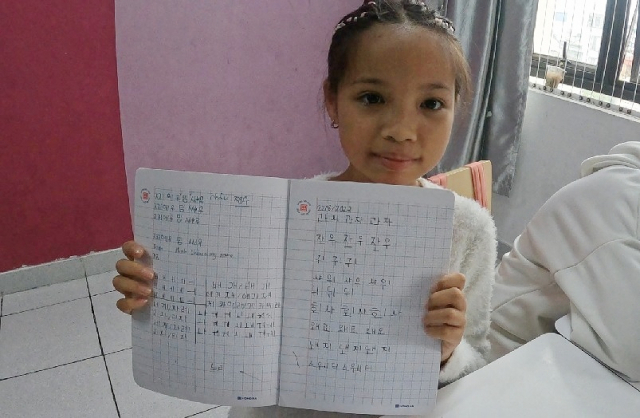 |
An elementary student at the Alfred Nobel School holds her Hangeul writing workbook during a Korean language class on Feb. 8. (Choi Jae-hee / The Korea Herald) |
HANOI, Vietnam – Located a five-hour flight from Seoul is a country where the Korean language's popularity is second only to its homeland of South Korea.
Here, kids as young as 8 -- or elementary school third grade -- are learning Korean at school, although not as a compulsory subject. This is the same age when they start learning English.
Another indication of the Korean language boom in Vietnam is the number of those who take the Test of Proficiency in Korean (TOPIK), an exam for non-native Korean speakers. This figure more than tripled between 2021 and 2022, from under 8,000 to a total of 28,450.
Korean is among seven world languages selected by the local educational authorities that can be taught as a "first foreign language,"which means that it can be taught from the third grade of elementary school, explains Won Kwang-seog, director of the Korea Education Office under the Korean embassy in Hanoi.
This comes after Korean was chosen as a second foreign language in 2019, which means it could be taught in middle and high schools.
Korean was the latest addition to the first foreign language league in 2021, along with German. They joined five others -- English, Chinese, Japanese, French and Russian.
“Vietnam selected Japanese as one of the main foreign languages for study in 2003, nearly 13 years before it launched a pilot program to offer Korean language classes at middle schools in 2016,” Won said.
Despite the late start, schools have adopted Korean at a remarkable pace. Last year, there were 11,600 students learning Korean at 79 elementary, middle and high schools across the nation. In comparison, Japanese courses were available at 121 schools.
In Hanoi alone, Korean is taught at one elementary, 33 middle and 10 high schools with the total number of learners exceeding 6,100.
In February this year, The Korea Herald visited some of the schools in Hanoi to explore the Korean learning trend and meet with young students and their teachers.
Alfred Nobel School
On Feb. 8, some 20 fifth grade students at Alfred Nobel School in Hanoi, a private integrated school offering elementary, middle and high school education, were learning the Korean alphabet from a native Korean teacher.
The class was taught in English, as most students’ Korean proficiency was at a beginner's level.
Students practiced writing basic letters of Hangeul in their notebooks and pronouncing simple Korean words like “gwaja (snack)” and “dwaeji (pig).”
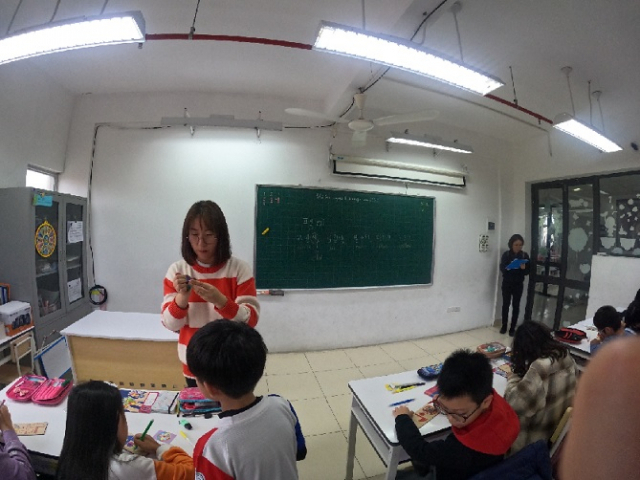 |
A Korean language teacher and her fifth-grade students make "paengi," Korean spinning tops, during a class on Feb. 8, 2023. (Choi Jae-hee / The Korea Herald) |
Another class for fifth graders made various "paengi," Korean spinning tops, as a Korean teacher taught the Korean words for different colors.
A Korean language teacher and her fifth-grade students make "paengi," Korean spinning tops, during a class on Feb. 8, 2023. (Choi Jae-hee / The Korea Herald)
The school’s Korean classes involve a lot of games and art activities to intrigue early grade schoolers’ interest in the foreign language, a school official said.
The school, which adopted Korean as a second foreign language subject in 2020, currently runs a total of 16 Korean language classes for students in grades 3-11. It is the first and only school in Hanoi that teaches Korean to elementary students. A typical elementary school in Vietnam has grades 1 to 5.
Since the first year, more than 400 students in elementary grades have chosen to study Korean. Each semester, an average of 70 take the Korean course by choice, Ngoc Tram, principal of the school, told The Herald.
“Amid the great popularity of Korean pop culture, a rising number of Vietnamese high schoolers seek to study abroad in Korea or enter Korean companies in Vietnam. There was a high demand for Korean language learning among our students, even before the Vietnamese government designated Korean as one of its first foreign languages in 2021,” she said.
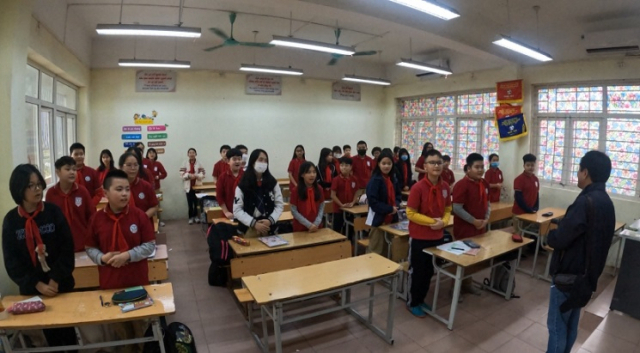 |
Students at Ngo Gia Tu Middle School stand up to bow to their teacher during a Korean language class on Feb. 8, 2023. (Choi Jae-hee / The Korea Herald) |
Ngo Gia Tu Middle School
Before including Korean as one of the first foreign language subjects for the school curriculum, Vietnam had conducted a pilot program at eight middle schools in Hanoi and Ho Chi Minh. Ngo Gia Tu Middle School was among them.
Three eighth-grade students at Ngo Gia Tu who have been studying Korean for the last three years sat down with The Herald to share their goals and dreams.
Khanh Phuong, whose favorite Korean phrase is “saranghae (I love you),” is planning to take the TOPIK. She is taking the test because she wants to study abroad in Korea later on.
“I want to work at Korean companies. My Korean is not good enough, so I will study harder,” she said.
Another of the trio, Thanh Le, who also wants to study in Korea in the future, said she is a huge fan of Korean TV dramas and entertainment shows.
“I want to understand Korean TV shows without subtitles,” she said.
Ngo Gia Tu currently has five Korean language classes, with each class consisting of 30-40 students.
Students at the school are taught basic grammar, words and sentence structures through textbooks and audiovisual materials like K-pop songs and YouTube videos, according to Choi Myung-chun, a native Korean teacher at the school.
“The number of students enrolled in Korean language courses here has been on the rise. There was one time when I had to teach two classes simultaneously, as too many students applied for my Korean course,” Choi said.
 |
Students majoring in Korean language at the Foreign Language Specialized School in Hanoi, a public high school affiliated with the University of Languages and International Studies under Vietnam National University (VNU-ULIS), on Feb. 10, 2023 (Choi Jae-hee / The Korea Herald) |
Foreign Language Specialized School
At the Foreign Language Specialized School, a public high school in Hanoi, there are more than 260 students who aspire to be fluent in Korean.
On the morning of Feb. 10, a group of eight 12th graders majoring in Korean were attending a lecture on Korean grammar.
A native Korean teacher was explaining advanced verbs and nouns, using a course book titled “Seoul National University Korean,” developed by the university for Korean language learners.
The class was one of the school’s four classes – with 80 students in total – whose students have chosen Korean as their first foreign language, which makes it their main language of study as a major. Another 260 students are learning the language as a second foreign language.
Most of the Korean majors at the school have studied the language since middle school, said Nguyen Giang, a Vietnamese Korean teacher there. The students pursue study abroad opportunities in Korea or hope to establish a career that utilizes their Korean skills.
“Senior Korean majors work hard to achieve at least a level 4 on TOPIK. By the time they graduate, many score level 5 or 6 on the exam,” she said.
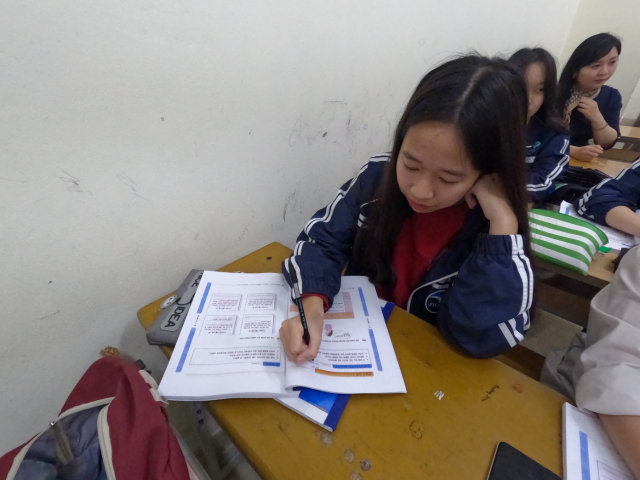 |
A student takes notes during a Korean language class on Feb. 10. (Choi Jae-hee / The Korea Herald) |
One of her students, Nguyen Linh, recently passed TOPIK level 5. She is now preparing to pass level 6 for extra points when applying to the Korean department of local universities.
“I am planning to major in Korean language at college, because job prospects for college graduates fluent in both Korean and Vietnamese seem to be bright,” Linh said.
She said that she and her classmates willingly immerse themselves in the sea of Korean culture after class as an extension of their studies.
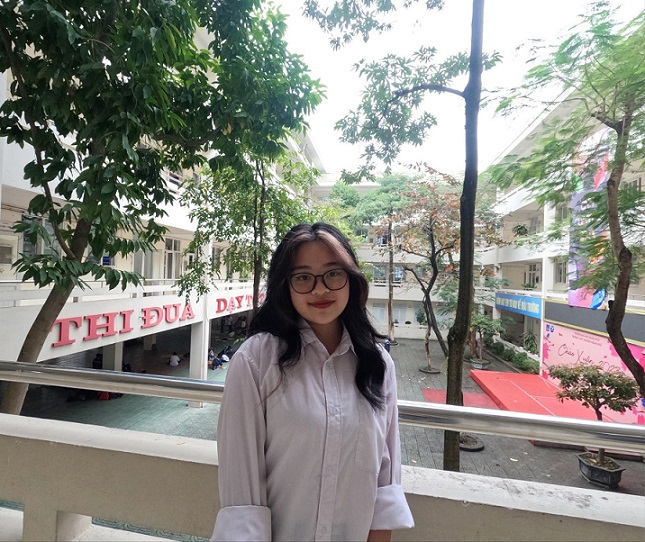 |
Nguyen Linh poses for a photo during an interview with The Korea Herald on Feb. 10 (Choi Jae-hee / The Korea Herald) |
“In the past, I couldn't understand a single word when listening to K-pop songs, but now I can understand what all the lyrics mean, which is amazing,” she said.
The FLSS, the only secondary school in Vietnam specializing in teaching foreign languages, added Korean to its official curriculum in the academic year of 2017-2018. Since then, Korean has been available as a first and second foreign language for students in grades 10-12.
Currently, it has a total of 80 students majoring in Korea as a first foreign language in four classes, while 183 other students learn it as a second foreign language in six classes.
There is tough competition to major in Korean, said Nguyen Phu Chien, principal of the FLSS. “We accept 25 new students for the Korean curriculum. But last year, more than 200 applied.”
Many of the Korean majors continue their Korean studies either at universities in Korea or in Vietnam, the principal added.
But recently, a growing number of senior students are considering selecting other popular majors like business administration to maximize their chances of landing a high-paying job.
“Since our students study Korean intensively during their school years, they find no difficulty in understanding daily conversations in Korean. By integrating their knowledge of Korean with other fields of study, they can become more versatile skilled workers in the employment market,” he said.
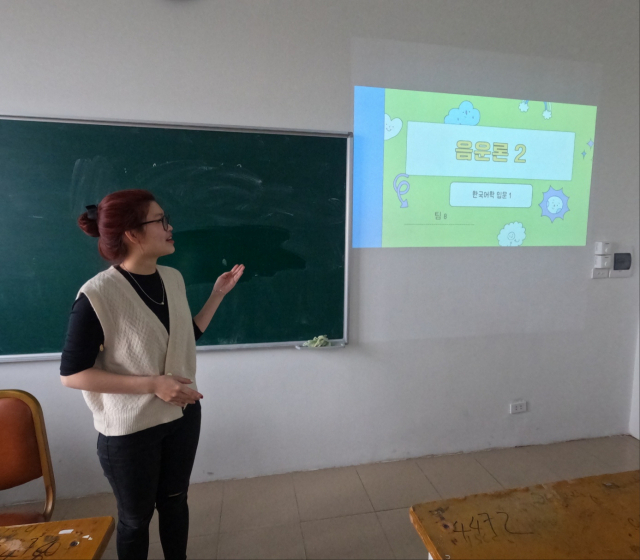 |
An undergraduate student at the University of Languages and International Studies under Vietnam National University (VNU-ULIS), who majors in Korean language and culture, gives a presentation on Korean phonology on Feb. 10. (Choi Jae-hee / The Korea Herald) |
Vietnam National University
At a classroom on the campus of the prestigious Vietnam National University’s University of Languages and International Studies (VNU-ULIS), a student was giving a presentation on Korean phonology in front of some 20 juniors.
As part of the Korean linguistics course run by the Korean language and culture department, the undergraduate class covered the phonological and phonetic properties of Korean vowels and consonants.
Students were actively engaging in their classmates' presentation on the sounds of the Korean language, taking notes on iPads and asking questions in both Korean and Vietnamese.
“The main objective of the Korean linguistics course is to help students who are already familiar with Korean to deepen their knowledge,” said Do Phuong Thuy, vice dean of the faculty.
In their third year of college, students are required to choose one of four submajors -- the Korean language and Korean culture, Korean-Vietnamese interpretation, Korean linguistics and Korean language education. Third year students’ Korean abilities are equivalent to level 5 or 6 on the TOPIK, she said.
In 1996, the VNU-ULIS opened the Korean language department. It was the second university to do so.
Now there are 51 other higher education institutions across the Southeast Asian country where the Korean language is taught as a major subject.
“There has been a gradual increase in the number of students applying to major in the Korean language and culture at our college. Many undergraduates in other majors also choose to study Korean as a second language,” said Tran Thi Huong, the dean.
As of this year, around 900 students are enrolled in the university's Korean department, and eight classes are offered for each grade, she added.
For many Korean majors at the VNU-ULIS, Korean cultural content like K-pop and K-dramas were their entry point to the language.
With hopes of becoming a Korean-to-Vietnamese translator for K-pop idols, Le Thi Mai Huong, a huge fan of the K-pop boy band EXO, had decided to major in Korean when she was in middle school.
 |
(From left) Le Thi Mai Huong and Hoang Phuong Trang, third-year students in the VNU-ULIS's Korean language and culture department, speak during an interview with The Korea Herald, on Feb. 10, 2023 (Choi Jae-hee / The Korea Herald) |
“I always wanted to study Korean so that I could speak Korean to EXO members one day,” she said.
Her classmate Hoang Phuong Trang also started learning Korean after falling in love with K-pop idols and other celebrities.
“I have studied Korean on my own through K-pop and K-dramas since 2012. I really enjoy watching Korean media content. I am dreaming of working as a film translator after graduation,” she said.
“The best thing about learning Korean is that I can watch Korean dramas and movies without English or Vietnamese subtitles. I am also happy that I can understand what my favorite Korean idols are saying during their live music programs.”
Job opportunities at Korean companies are another motivation for her Korean studies.
“Last year marked the 30th anniversary of bilateral ties between South Korea and Vietnam. Thanks to the two countries’ deepening economic relationship, there have been more opportunities (for Vietnamese undergraduates fluent in Korean) to work at Korean companies here,” Trang added.
The continued craze for Korean language learning in Vietnam has amped up competition for admission to local universities’ Korean departments.
The competititon was 3:1 for spots in ULIS’ Korean department last year. For the past five to six years, applicants’ college entrance exam scores have always been at the top, officials said.
Korean teachers in short supply
The soaring demand for Korean education has created a challenge – a shortage of qualified teachers.
During The Herald’s visits, it was observed that most schools had only a few qualified teachers – two or three in most cases – which restricts their ability to expand classes or offer high-quality tutoring.
Doan Thai Son, principal of Tran Phu High School for the Gifted in Hai Phong, a major seaport city located about 120 kilometers east of the capital Hanoi, noted the importance of nurturing local Korean educators for the sustainability of Korean education in Vietnam.
“Our school has native Korean teachers who are dispatched from Korea, but I believe it is Vietnamese Korean experts who will play a key role in the development of Korean studies in Vietnam,” Son said.
Tran Phu High School, which adopted Korean as a second foreign language in 2021, offers four Korean classes for 10th and 11th graders.
As of this year, more than 140 students take Korean courses at the school, but there are only four Korean teachers -- two Vietnamese and two native Koreans.
Augmenting the pool of qualified Korean teachers is a matter of top priority for the KEO in Hanoi, said its director Won.
While the Korean government will continue to dispatch native teachers to schools that request them, it will also help nurture local talent, he stressed.
“The KEO plans to hold a workshop for Vietnamese Korean teachers in April with professors and researchers specializing in Korean language education at Seoul National University,” he added.
Launched in 2020 in Hanoi, the KEO is committed to promoting the proliferation of Korean culture and language by organizing cultural events like Korean speech contests, dispatching native Korean teachers to primary and secondary schools across Vietnam and running its own Korean language programs.
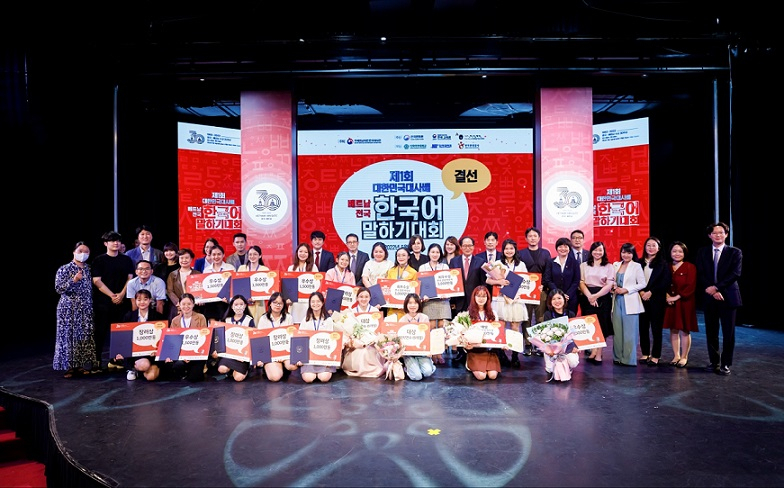 |
The first Korean language speech contest held in June last year jointly by the Korean Cultural Center in Hanoi, the Korean Education Office in Hanoi under the Korean Embassy in Vietnam, and the King Sejong Institute Foundation, to celebrate the 30th anniversary of Korea-Vietnam diplomatic relations. (Courtesy of the Korean Education Office in Hanoi) |
“It is important to have a two-track approach based on expanding the number of native-speaking Korean teachers in Vietnam and improving the quality of local teachers,” Won said.







